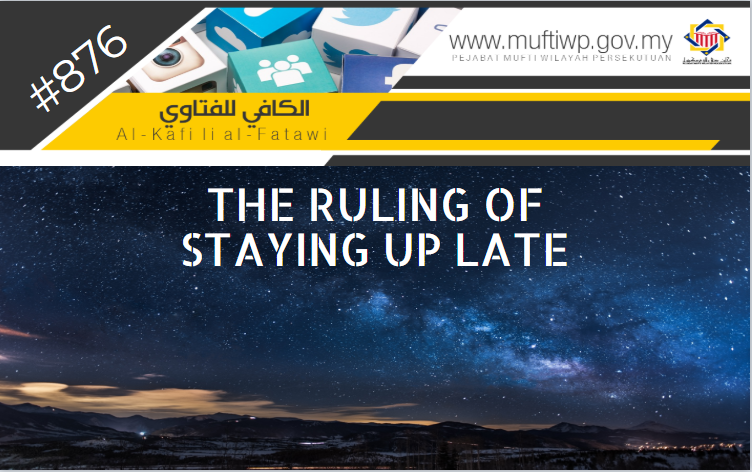Question:
Assalamualaikum wrm.wbt.,
What is the ruling for a person who stayed up all night, for example during exam week and others?
Answer:
Waalaikumussalam wrm. wbt.
Alhamdulillah, praise and thanks to Allah for the countless blessings He has blessed us all with. Blessings and salutations to the Prophet Muhammad PBUH, his wives, his family, companions and all those that follow his teachings to the day of judgement.
The question regarding this issue should be viewed according to the factors that lead to why the person has to stay up all night. The reason is there are several narrations which mentioned this matter and it is closely related with the activity or actions performed during this time. In a hadith narrated by Abdullah Ibn Mas’ud RA, where the Prophet PBUH said:
لاَ سَمَرَ إِلاَّ لِمُصَلٍّ أَوْ مُسَافِرٍ
“There is no conversation during the night except for those who pray or on a travel.”
Sunan al-Tirmizi (2730)
Syeikh Muhammad bin Abd al-Rahman al-Mubarakfuri Rahimahullah when commenting on the meaning of the word سَمَرَ, said: It means the act of talking or having conversations at night. See Tuhfah Al-Ahwazi, Al-Mubarakfuri (1/433).
According to this hadith, the act of staying up at night to talk after the isya’ prayer is impermissible except for those who intend to pray or are travelling. This restriction is clearer according to a hadith narrated by Ibn Mas’ud where the Prophet PBUH said:
جَدَبَ لَنَا رَسُولُ اللَّهِ ـ صلى الله عليه وسلم ـ السَّمَرَ بَعْدَ الْعِشَاءِ
"The Messenger of Allah rebuked us for staying up (talking) after the 'Isha'."
Sunan Ibn Majah (703)
Imam Ibn Majah in his brief commentary on the meaning of the word جَدَبَ he said: “It is a warning and restriction for us.”
However, the restriction stated in the above narrations is not in an absolute form. The reason is there are several narrations which show that the Prophet PBUH and the Companions themselves did so (staying up) if there is a necessity or benefit from it. Among them is a hadith narrated by Umar bin al-Khattab RA, where he said:
كَانَ رَسُولُ اللَّهِ صلى الله عليه وسلم يَسْمُرُ مَعَ أَبِي بَكْرٍ فِي الأَمْرِ مِنْ أَمْرِ الْمُسْلِمِينَ وَأَنَا مَعَهُمَا
“The Messenger of Allah (ﷺ) was staying up late one night with Abu Bakr, discussing some issue of the Muslims, and I was with him,”
Sunan al-Tirmizi (169)
Imam al-Syaukani Rahimahullah cited a good opinion from Imam al-Tirmizi when commenting on this issue saying: Scholars from among the companions of the Prophet PBUH, tabiin, and people after them have differing opinions regarding the act of al-samar (staying up to talk) after isya’ prayer. Some of them state that it is makruh, while others give a facilitation for it if it is to discuss on knowledge and other necessities. Most hadiths show that there is rukhsah (facilitation for the action). And this hadith shows that it is not makruh to talk during the night after isya’ if there is a religious need for it regardless whether it is a general or specific need. While the hadith from Abi Barzakh and Ibnu Mas’ud show that it is makruh.
The way to harmonize both (hadiths which show that it is makruh and permissibility of it) is by concluding that the hadiths which restrict it refer to permissible but unbeneficial speech. Whereas hadiths that permit it refer to beneficial speech. Refer Nail al-Authar, Al-Syaukani (2/19).
Coclusion
To close, we would like to state that staying up for the purpose of good such as having discussions about something that could lead to the maslahah for the ummah, study, fulfilling the responsibilities of work and others is permissible. Consequently, staying up late to steal, commit sin and other bad deeds is haram. While if a person stays up late just to talk about nothing, watch movies, football match and others if it leads to the negligence of the Subh prayer, then it is makruh.
Lastly, may Allah SWT give us the correct understanding in practising the religion. Amin.


